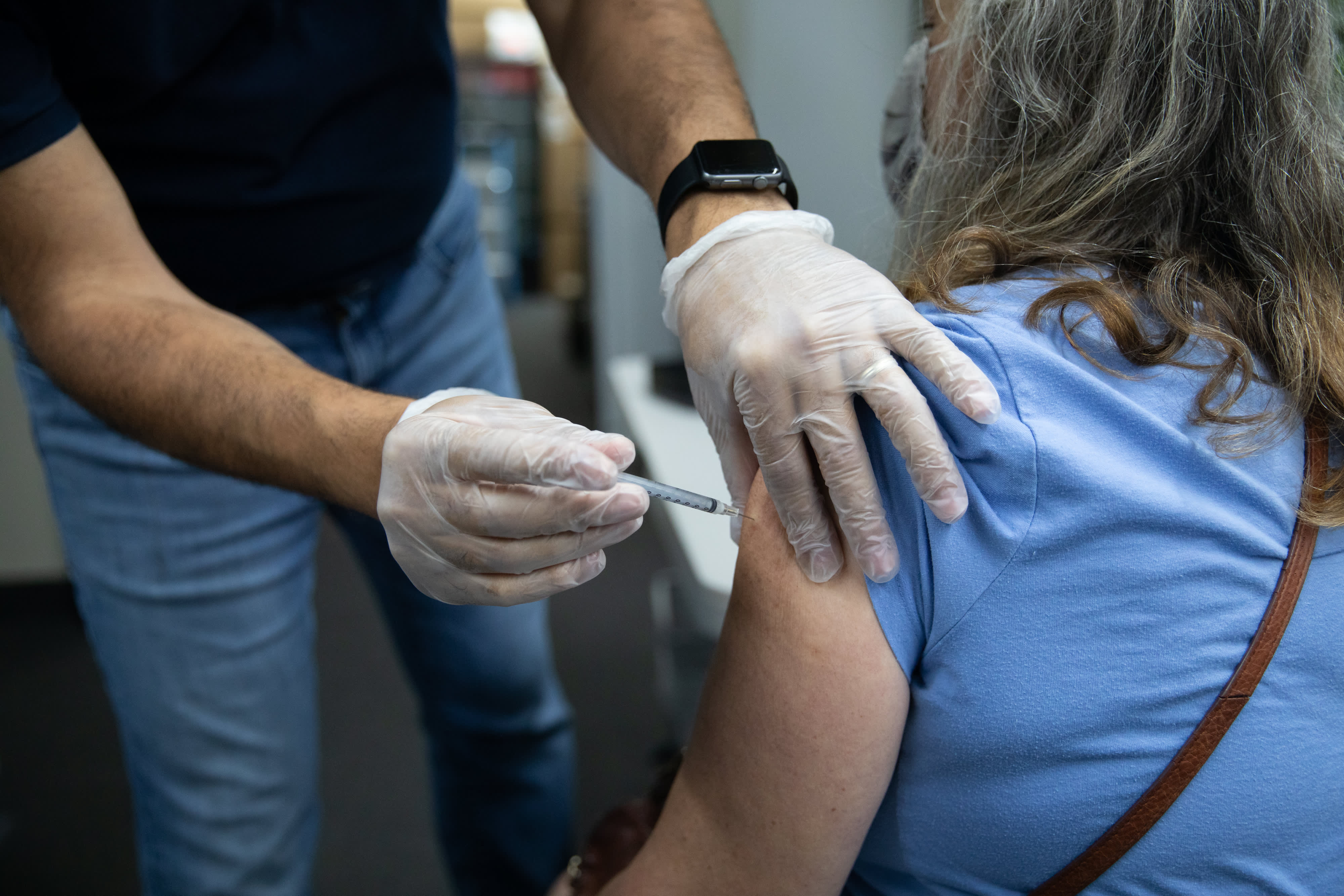U.S. will begin wide distribution of Covid booster shots next month, saying vaccine protection wanes over time

A pharmacist administers a third dose of the Pfizer-BioNTech Covid-19 vaccine to a customer at a pharmacy in Livonia, Michigan, U.S., on Tuesday, Aug. 17, 2021.
Emily Elconin | Bloomberg | Getty Images
The United States will begin widely distributing Covid-19 booster shots next month as new data shows that vaccine protection wanes over time, top U.S. health officials announced in a joint statement Wednesday.
It’s now “very clear” that immunity starts to fall after the initial two doses, and with the dominance of the delta variant, “we are starting to see evidence of reduced protection against mild and moderate disease,” according to the statement signed by CDC Director Dr. Rochelle Walensky, acting FDA Commissioner Dr. Janet Woodcock, White House chief medical advisor Dr. Anthony Fauci and other U.S. health leaders. “Based on our latest assessment, the current protection against severe disease, hospitalization, and death could diminish in the months ahead, especially among those who are at higher risk or were vaccinated during the earlier phases of the vaccination rollout.”
As a result, U.S. agencies are preparing to offer booster shots to all eligible Americans beginning the week of Sept. 20, starting 8 months after their second dose of Pfizer or Moderna’s vaccines, officials said. While they said recipients of Johnson & Johnson‘s single-shot vaccine will likely need boosters, they are awaiting more data in the next few weeks before making a formal recommendation.
“With those data in hand, we will keep the public informed with a timely plan for J&J booster shots as well,” officials said.
The plan is still subject to FDA approval and a formal recommendation from a CDC vaccine advisory committee, according to U.S. officials.
The announcement comes ahead of a White House Covid press briefing Wednesday, where federal health officials are expected to further outline their plan for boosters. President Joe Biden is expected to speak on the U.S. effort after the briefing, the White House told reporters Tuesday.
The decision to recommend booster shots comes as the public becomes increasingly concerned about the delta variant and a rise in breakthrough cases – infections in fully vaccinated individuals. It marks a shift from previous comments made by U.S. health officials, who said in recent months that fully vaccinated Americans did not need booster shots at this time.
U.S. officials changed their message on boosters in recent days as cases continued to rise. Fauci said Thursday that everybody will “likely” need a booster shot at some point. On Friday, federal officials approved administering booster shots to Americans with weakened immune systems, which includes cancer and HIV patients and people who have had organ transplants.
National Institutes of Health Director Dr. Francis Collins, who also signed on to the statement, said Tuesday that new Covid data, including from Israeli health officials, caused U.S. health leaders to rethink their position on vaccine boosters. Israel released new data Monday showing a reduction in the effectiveness of Pfizer’s Covid vaccine against severe illness among people 65 and older who were fully vaccinated in January or February.
The U.S. is beginning to see similar trends in vaccine effectiveness as well, Collins said. He said the rise in breakthrough cases may be due to a combination of the fast-spreading delta variant and Covid vaccine protection waning over time.
“Although right now, it’s still as if our vaccine protection is working really well,” he said. “But we don’t want to wait until it’s like oh, too late.”
The move to recommend boosters is likely to spark criticism, especially as a large portion of the global population has yet to receive even one dose of a Covid vaccine.
Earlier this month, the World Health Organization asked wealthy nations to stop the distribution of booster shots until at least the end of September to give poorer countries the chance to vaccinate their populations with the first rounds of shots. The request is part of WHO Director-General Tedros Adhanom Ghebreyesus’ plan to vaccinate 40% of the world by December.
Lawrence Gostin, director of the WHO’s Collaborating Center on National and Global Health Law, called the U.S. booster shot plan “a slap in the face” to the international health agency.
“There’s a better way to create a win-win,” he said in a phone interview. “We should boost only our health workers and vulnerable people. At the same time, Biden should pledge a bold campaign to vaccinate the world, including vastly increased donations and a surge in vaccine production.”
“That way we do good to America and do good for the world. It’s in our national interests to stop the development of even more dangerous variants,” he added.
During a White House press briefing Tuesday, press secretary Jen Psaki said the administration believes it can boost the American population while ensuring the rest of the world gets vaccinated.
“We believe that is a false choice. We can do both,” Psaki said. “The United States is far and away the biggest contributor to the global fight against Covid. We will continue to be the arsenal for vaccines around the world. We also have enough supply and had long planned enough supply should a booster be needed for the eligible population.”
Once booster shots are approved, nursing home residents, health-care providers and the elderly – the first groups to get vaccinated in December and January – are likely to be prioritized to get extra shots, Collins said Tuesday. He said “ideally” people should stick with the same manufacturer they got their first two doses from.
“But if for some reason you don’t have access to it, well, then get the other one,” he said. “Again, I’d feel more comfortable as a scientist fixing our plans on real data, and that means sticking to the same kind of vaccine that you got to begin with.”




